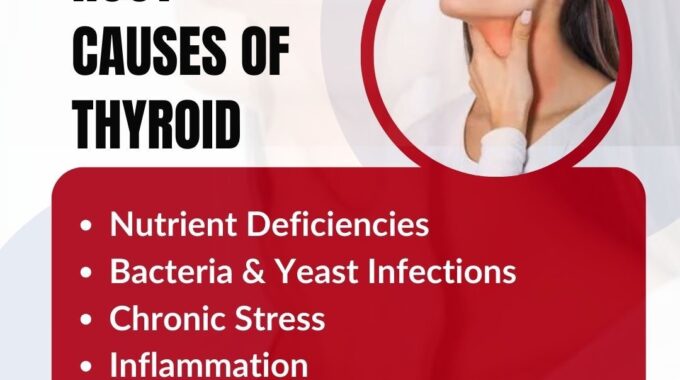WAYS TO HEAL THYROID NATURALLY • Dietary Changes • Supplementation • Rebalance Your Hormones #parathyroidsurgeryabudgabi…

ROOT CAUSE OF THYROID
The root causes of thyroid disorders can vary depending on the specific condition, but several underlying factors may contribute to thyroid dysfunction. Here are some potential root causes:
1. Autoimmune Dysfunction: Autoimmune diseases, such as Hashimoto’s thyroiditis and Graves’ disease, are the most common root causes of thyroid disorders. In Hashimoto’s thyroiditis, the immune system attacks the thyroid gland, leading to hypothyroidism, while in Graves’ disease, the immune system stimulates the thyroid gland, causing hyperthyroidism.
2. Genetic Predisposition: Genetic factors can play a role in thyroid disorders. Individuals with a family history of thyroid disease may be at increased risk of developing thyroid disorders themselves.
3. Environmental Factors: Environmental factors, such as exposure to toxins, pollutants, or radiation, may contribute to thyroid dysfunction. For example, exposure to certain chemicals or heavy metals can disrupt thyroid hormone production and regulation.
4. Iodine Deficiency or Excess: Iodine is essential for thyroid hormone synthesis. Both iodine deficiency and excess can disrupt thyroid function. In regions with iodine deficiency, hypothyroidism may be more prevalent, while excessive iodine intake can lead to hyperthyroidism.
5. Nutritional Imbalances: Nutritional deficiencies, such as deficiencies in selenium, zinc, vitamin D, or vitamin B12, can affect thyroid function. Additionally, imbalances in nutrients like iron or omega-3 fatty acids may impact thyroid health.
6. Stress and Hormonal Imbalance: Chronic stress and hormonal imbalances can affect the hypothalamic-pituitary-thyroid (HPT) axis, which regulates thyroid hormone production and secretion. Imbalances in other hormones, such as cortisol, estrogen, or testosterone, can also influence thyroid function.
7. Gut Health: Dysfunction in the gut microbiome or intestinal permeability (leaky gut) may contribute to autoimmune thyroid disorders by triggering an immune response and inflammation.
8. Medications and Medical Treatments: Certain medications, such as lithium, amiodarone, or cancer treatments, can affect thyroid function. Additionally, radiation therapy to the head, neck, or chest may damage the thyroid gland and lead to thyroid dysfunction.
Identifying and addressing the underlying root causes of thyroid dysfunction is essential for effective management and treatment. A comprehensive approach that considers lifestyle factors, environmental influences, and individual health history can help address the root causes and support thyroid health. It’s important to work closely with a healthcare provider knowledgeable about thyroid disorders to develop a personalized treatment plan.
#thyroiddubai
#thyroidcentreuae
#bestsurgeonuae


This Post Has 0 Comments